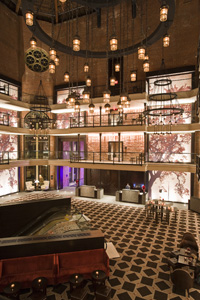The QUIKRETE® Companies played an integral role in a $150 million rehabilitation and expansion project of the Charles Street Jail in Boston, Mass. Designed by renowned architects, Gridley James Fox Bryant and Rev. Louis Dwight, the jail was in active use from 1851 to 1990, when deteriorating physical conditions forced its closure.
Since the property was situated in the heart of the Beacon Hill neighborhood, city historic and development organizations sought to renovate and preserve the building, which at one point was an international model for prison architecture.
Cambridge Seven Associates (C7A), a full service architectural design firm, coordinated efforts to preserve much of the original architecture in converting the jail into the modern, upscale Liberty Hotel. Phoenix Bay State Construction Corp. (PBS Construction), a historic masonry restoration company in Boston, aided in the conversion of the 157-year-old jail and building of a new 16-story, 280-room tower situated behind the old jail.
In renovating the jail, the goal was to maintain the existing granite block exterior and preserve as many interior brick walls as possible. In some cases, this meant pulling down brick walls, saving original hardware and jail doors, and rebuilding walls using QUIKRETE® Mason Mix Type N. The former jail was transformed through meticulous planning into 18 suites and a variety of public spaces, including a lobby and reception areas, two restaurants, a bar, grand ballroom and meeting rooms.
The transformation of the site into a luxury hotel was the work of the architect collaborating with historians, conservationists and masonry restoration experts to ensure that the end result was a careful balance between preservation and modern functionality. To restore the historical landmark, PBS Construction salvaged existing granite and incorporated it into exterior landscaping and the connection between the new and old buildings. Because the 16-story tower was composed of brick and not granite, like the former jail, a smooth transition between structures was created using re-fabricated granite sized to align with the brick on the new building. This resulted in a clean, level line where the buildings meet.
The masonry work was at the heart of the five-year renovation. Over 350,000 bricks were laid with one hundred, 80-pound bags of QUIKRETE® Mason Mix Type N and 280 bulk bags (3,000 pounds each) of QUIKRETE® Type N Aspen Tan mortar. Over 20 masons completed the brick and stonework during an 18-month span, using a total of 848,000-pounds of QUIKRETE® materials.
"The QUIKRETE® Companies prides itself on being a resource for renovation and restoration projects, including work on the Martin House Complex by Frank Lloyd Wright in Buffalo, N.Y. and Boston's own Fenway Park," said Dennis Winchester, QUIKRETE® executive vice president. "We were privileged to be part of this most recent project to preserve the great architectural history of Boston."
Work crews made extensive efforts to preserve existing brick, which was eventually used to rebuild the Scampo restaurant, Italian for "escape," and Alibi lounge, formerly the "drunk tank." Portions of this project phase, in particular, were tedious. For example, to make doorways bigger, crews had to remove entire walls, which made the structure shift. All the while, workers took care to preserve old hardware and original wrought-iron bars, now adorning the three-story arched lounge and lobby windows. Among the other features preserved were remnants of jail cells within the hotel lobby bar and the historic catwalks that wrap around the central atrium.
One of the challenges faced during the project was the Massachusetts climate, because a majority of the work was done during the winter months. In order to keep mortar from freezing, masons were careful to keep temperatures above 40 degrees using enclosed scaffolding and running heaters 24 hours a day.
In addition to this challenge, the building was close to the street, making the mixing site extremely tight. This increased the importance of logistics and inventory management. Since the area designated for mixing was confined to a small alleyway, the QUIKRETE® bulk mortar and Spec-Mix silo system proved to be an invaluable resource to masonry crews.

"We wanted to work with The QUIKRETE® Companies, because the Spec-Mix silo system accommodated our limited work space and helped save labor costs without need for shoveling sand piles," said Joe Goncalves, general field superintendent at PBS Construction. "By using QUIKRETE® bulk bags, we were able to keep the color consistent throughout the whole project. To top it off, QUIKRETE® offers a variety of colors, so we had no trouble matching the original mortar to preserve the historical aspects of the building."
Built in 1851, the original granite edifice of the Charles Street Jail was innovative for its day, comprising a cruciform-shaped structure complete with a 90-foot central rotunda and cupola. The jail was originally designed to house one inmate per cell, but was forced to double up occupancy. As the physical conditions grew worse, with peeling paint, outdated plumbing and increasingly overcrowded cells, the jail was forced to close in 1990. Before closing, the prison hosted many famous inmates, such as former Boston Mayor James Michael Curley, who served time for fraud after he took a civil service exam for a friend in 1904.
Since opening in September 2007, the hotel has welcomed many notable dignitaries and celebrities from around the world as guests. Additional information on the project and Liberty Hotel can be found at
www.LibertyHotel.com.
